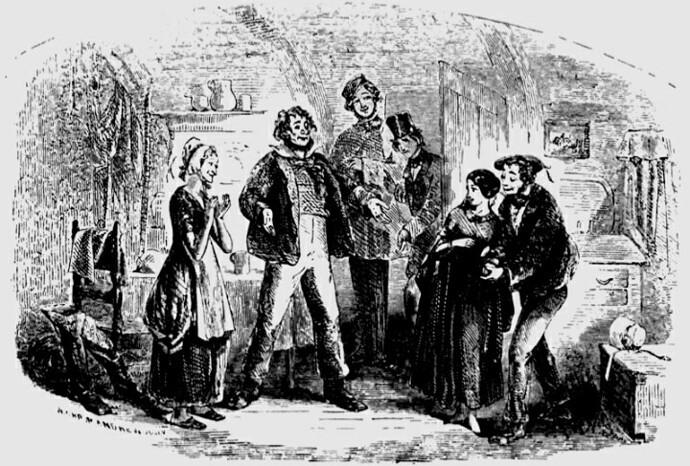Richard (2004): . . . ‘feeling good for its own sake’ – as in, ‘it feels good to be feeling good’, that is – is conducive to engendering more, and not less, of what is rather plaintively depicted by that ‘a good time was had by all’ catch phrase . . . namely: a communal feeling of well-being (a.k.a., ‘community spirit’). As in ‘the life and soul of the party’, for instance, there being nothing quite like a glum and/or grumpy party-pooper to cast a pall over festivities.
One of the very first things realised by the identity inhabiting this flesh-and-blood body, all those years ago, was . . . that the best thing ‘he’ could do for other people, at all times and in all places, was to cease forthwith being a miserable and malicious blighter, on whatever justifiable occasion it might be, and instead be someone always pleasant and thus engaging to be with, in all situations and circumstances, with the ultimate aim of having the overarching benevolence and benignity of the PCE become apparent, in the everyday/ workaday world, for evermore.
Mailing List 'D' Respondent No. 4
I was reading a chapter in Dickens’ David Copperfield to my son this evening when I was struck by a certain scene in the book which I thought depicted very nicely the effect that felicitous and innocuous vibes can have on people in a convivial setting.
Background: Copperfield, now a young man, pays a surprise visit to friends he hasn’t seen since he was a young lad. He’s accompanied by his pal Steerforth who has a unique gift for making everyone he comes across, no matter how cynical or anxious their disposition, at ease and cheerful in his presence.
Copperfield and Steerforth enter, unexpected and uninvited, into the warm quaint house of Copperfield’s friend, Mr. Peggoty, interrupting festivities surrounding the just-announced engagement between Mr. Peggotty’s niece, Em’ly, and the good Mr. Ham. Copperfield, bearing witness to this event, feels himself teetering on the edge of conflicting sentiments. Em’ly was his dear childhood sweetheart to whom he had been supremely devoted. On one hand, there is great happiness for her prospects. On the other, there’s a pain inside him from the thought of losing her to another forever, which threatens to spoil the celebration.
Abashed and startled by Copperfield’s sudden reappearance, and no doubt flooded with her own conflicting emotions, Em’ly dashes away into another room to be alone. Steerforth at this juncture picks up the reigns. He safely guides the gathering back into a festive milleu with his unassuming, infectious and inexhaustible felicitous nature.
Whether I had come there with any lingering fancy that I was still to love little Em’ly, I don’t know. I know that I was filled with pleasure by all this; but, at first, with an indescribably sensitive pleasure, that a very little would have changed to pain.
Therefore, if it had depended upon me to touch the prevailing chord among them with any skill, I should have made a poor hand of it. But it depended upon Steerforth; and he did it with such address, that in a few minutes we were all as easy and as happy as it was possible to be.
“Mr. Peggotty,” he said, “you are a thoroughly good fellow, and deserve to be as happy as you are to-night. My hand upon it! Ham, I give you joy, my boy. My hand upon that, too! Daisy, stir the fire, and make it a brisk one! and Mr. Peggotty, unless you can induce your gentle niece to come back (for whom I vacate this seat in the corner), I shall go. Any gap at your fireside on such a night—such a gap least of all—I wouldn’t make, for the wealth of the Indies!”
So Mr. Peggotty went into my old room to fetch little Em’ly. At first little Em’ly didn’t like to come, and then Ham went. Presently they brought her to the fireside, very much confused, and very shy,—but she soon became more assured when she found how gently and respectfully Steerforth spoke to her; how skilfully he avoided anything that would embarrass her; how he talked to Mr. Peggotty of boats, and ships, and tides, and fish; how he referred to me about the time when he had seen Mr. Peggotty at Salem House; how delighted he was with the boat and all belonging to it; how lightly and easily he carried on, until he brought us, by degrees, into a charmed circle, and we were all talking away without any reserve.
Em’ly, indeed, said little all the evening; but she looked, and listened, and her face got animated, and she was charming. Steerforth told a story of a dismal shipwreck (which arose out of his talk with Mr. Peggotty), as if he saw it all before him—and little Em’ly’s eyes were fastened on him all the time, as if she saw it too. He told us a merry adventure of his own, as a relief to that, with as much gaiety as if the narrative were as fresh to him as it was to us—and little Em’ly laughed until the boat rang with the musical sounds, and we all laughed (Steerforth too), in irresistible sympathy with what was so pleasant and light-hearted. He got Mr. Peggotty to sing, or rather to roar, “When the stormy winds do blow, do blow, do blow;” and he sang a sailor’s song himself, so pathetically and beautifully, that I could have almost fancied that the real wind creeping sorrowfully round the house, and murmuring low through our unbroken silence, was there to listen.
As to Mrs. Grummidge, he roused that victim of despondency with a success never attained by any one else (so Mr. Peggotty informed me) since the decease of the old one. He left her so little leisure for being miserable that she said next day she thought she must have been bewitched.
